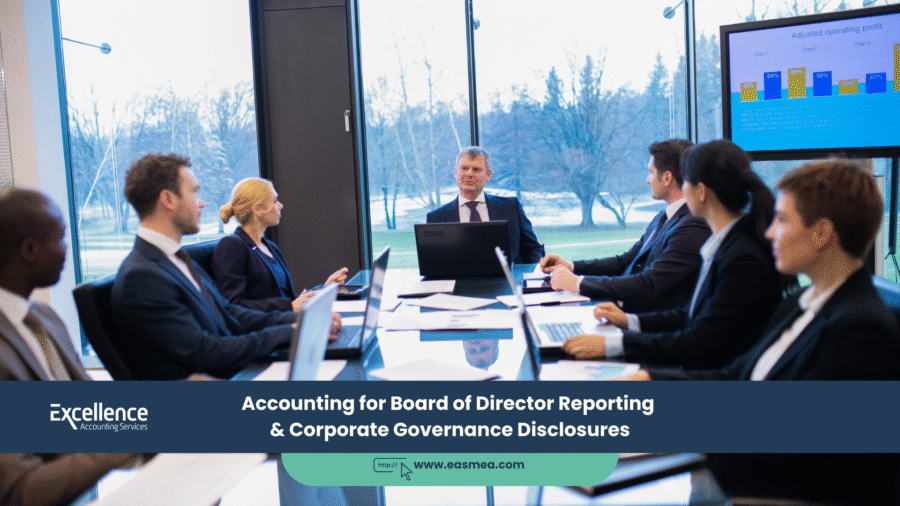Accounting for Board of Director Reporting and Corporate Governance Disclosures
In today’s business environment, the role of a company’s Board of Directors has evolved far beyond ceremonial oversight. Boards are now active stewards of the company’s strategy, risk management, and long-term value creation. To fulfill this duty, they require more than just a standard set of financial statements. They need insightful, forward-looking financial information presented with clarity and context. This is the essence of effective board reporting.
- Accounting for Board of Director Reporting and Corporate Governance Disclosures
- Transforming Board Reports from Data Dumps to Strategic Dashboards
- The Pillars of Corporate Governance Disclosure
- What Excellence Accounting Services (EAS) Can Offer
- Frequently Asked Questions (FAQs)
- From Compliance to Confidence.
Running parallel to this is the increasing demand from investors, regulators, and the public for transparency, which is achieved through robust corporate governance disclosures. These disclosures are the window through which stakeholders view the integrity of a company’s leadership and processes. For companies in the UAE, adhering to governance frameworks set by bodies like the Securities and Commodities Authority (SCA) is not just good practice—it’s a requirement.
This guide explores the critical accounting principles that underpin both effective board reporting and strong corporate governance. We will detail how finance leaders can transform their reporting from a historical exercise into a strategic tool and ensure their governance disclosures build confidence and trust.
Key Takeaways
- Board Reporting is Strategic: It’s about providing forward-looking analysis, KPIs, and risk assessments, not just historical profit and loss statements.
- Context is Crucial: Financial data must be presented with a clear narrative (Management Discussion & Analysis) that explains the “why” behind the numbers.
- Governance Builds Trust: Transparent disclosures about board structure, executive pay, and risk management are essential for maintaining investor confidence.
- The Audit Committee is Key: This board subcommittee plays a vital role in overseeing financial reporting integrity, internal controls, and the relationship with external auditors.
- Compliance is Mandatory: Adherence to corporate governance codes is a regulatory requirement for public companies and a best practice for all others seeking investment or growth.
Transforming Board Reports from Data Dumps to Strategic Dashboards
A common mistake is to provide the board with the same financial package that is used for internal management. An effective board report, or “board pack,” is a curated, high-level document designed for strategic oversight, not day-to-day management. Its financial components should include:
- Executive Financial Summary: A one-page dashboard highlighting the most critical financial headlines—revenue growth, net profit, cash balance, and key covenants.
- Management Discussion & Analysis (MD&A): A clear narrative explaining the period’s results. It should analyze performance drivers, explain significant variances from the budget, and discuss known risks and opportunities.
- Condensed Financial Statements: Including the Income Statement, Balance Sheet, and Cash Flow Statement, often presented with comparisons to budget and the prior year. Our financial reporting services specialize in creating these packages.
- Key Performance Indicators (KPIs): A mix of financial (e.g., EBITDA margin, debt-to-equity ratio) and non-financial (e.g., customer acquisition cost, employee turnover) metrics that reflect the health of the business.
- Cash Flow Forecast: A forward-looking projection of cash inflows and outflows, which is critical for assessing the company’s liquidity and solvency.
The Pillars of Corporate Governance Disclosure
Corporate governance is the system of rules, practices, and processes by which a company is directed and controlled. Public disclosures on governance provide stakeholders with assurance that the company is run ethically and in their best interests. Key disclosure areas include:
| Disclosure Area | What It Involves | Why It’s Important |
|---|---|---|
| Board Composition | Disclosing the identity, skills, and background of each director, and clearly identifying which directors are considered “independent.” | Demonstrates that the board has a diverse skill set and a sufficient number of independent voices to challenge management and provide objective oversight. |
| Executive Compensation | A detailed report on the remuneration (salary, bonuses, stock options) of key executives and the philosophy behind it. | Shows stakeholders how leadership is incentivized and ensures that pay is aligned with performance and long-term shareholder value. |
| Related-Party Transactions | Disclosing any business transactions between the company and its directors, major shareholders, or their family members. | Ensures transparency and helps prevent conflicts of interest where insiders could benefit unfairly from their position. |
| Risk Management | A description of the board’s process for identifying, assessing, and mitigating key business risks (financial, operational, strategic). | Provides assurance that the board is proactively managing threats to the company’s success. A robust internal audit function is crucial here. |
Effective board reporting tells you where the business is going. Strong corporate governance assures you it’s on the right path.
What Excellence Accounting Services (EAS) Can Offer
Meeting the high standards of board reporting and corporate governance requires significant expertise and resources. Excellence Accounting Services provides the support and guidance needed to elevate your financial communications.
- Board Pack Preparation: We help you design and prepare clear, insightful, and professional board reporting packages that provide strategic value to your directors.
- CFO Services: Our part-time or interim CFOs can attend board meetings, present financial results, and provide the high-level strategic financial guidance your board expects.
- Corporate Governance Advisory: We provide business consultancy to help you establish governance structures, draft committee charters, and ensure your disclosures meet regulatory requirements and best practices.
- Internal Control & Risk Management: We assist in designing and testing your internal control framework, providing the board and audit committee with assurance over the integrity of financial reporting.
- Tax & Compliance Reporting: We ensure that the board is kept fully informed of the company’s compliance with Corporate Tax and VAT regulations, a key fiduciary responsibility.
Frequently Asked Questions (FAQs)
A management report is typically very detailed, operational, and used for day-to-day decision-making. A board report is strategic, high-level, and focused on governance and oversight. It summarizes performance and focuses on future outlook and risk rather than granular operational data.
An independent director is someone who has no material relationship with the company outside of their board seat. They are not an employee, a major supplier, or a customer, and they don’t have close family ties to the executive team. Their role is to provide objective judgment.
The Audit Committee is a subcommittee of the Board of Directors responsible for overseeing financial reporting, internal controls, and the external audit process. They meet separately with the auditors and act as the board’s watchdog for financial integrity.
Boards typically meet quarterly and should receive a comprehensive board pack at least a week before each meeting. For companies in a more volatile situation, monthly financial updates to the board may be appropriate.
These are transactions between the company and its owners, directors, or senior management. For example, leasing a building owned by the CEO’s spouse. They are scrutinized to ensure the transaction is conducted at a fair, “arm’s-length” price and that the insider is not receiving preferential treatment.
Yes. While formal disclosure rules mainly apply to public companies, adopting good governance practices is essential for any company seeking external investment, planning for a future sale, or simply wanting to operate professionally and ethically. A strong governance story is a key part of any due diligence process.
They should be presented in a simple dashboard format alongside the financial KPIs. Choose a handful of the most critical metrics (e.g., customer satisfaction score, market share, website traffic) and show the trend over time with a brief commentary on performance.
The external auditor provides an independent opinion on whether the company’s financial statements are free from material misstatement. This independent verification is a cornerstone of corporate governance, providing a crucial check on the information prepared by management.
Minutes are the official legal record of the board’s decisions and deliberations. They provide evidence that the directors have fulfilled their fiduciary duties of care and diligence. They document the approval of financial statements, major transactions, and strategic plans.
The consequences can be severe, ranging from a loss of investor confidence and a falling share price to regulatory fines, legal action against directors, and, in the worst cases, corporate failure. Strong governance is not a luxury; it’s a necessity for sustainable success.
Conclusion: The Bedrock of Stakeholder Confidence
In the final analysis, high-quality board reporting and transparent corporate governance are about building and maintaining trust. They provide directors with the tools to guide the company effectively and assure shareholders, employees, and regulators that the business is being managed responsibly and ethically.
By investing in the systems, processes, and expertise to excel in these areas, a company creates a bedrock of confidence that supports long-term growth and resilience in an ever-changing business world.
From Compliance to Confidence.
Let Excellence Accounting Services help you craft insightful board reports and build a corporate governance framework that inspires trust.




